
Recently on Cyclingnews.com |
Bob Stapleton feature, October 1, 2006.
T-Mobile 2007: Masters and apprentices
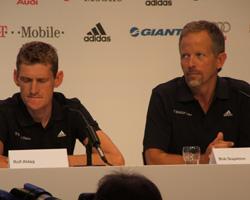
|
Bob Stapleton is a new face to the Pro Tour, and he is bringing his uniquely American style to the European peloton. He spouts the American business lingo of pragmatism, team philosophy, the importance of teamwork and the team environment, the role of communication, and the necessity of international diversity. In a wide-ranging conversation with Cyclingnews' Susan Westemeyer, he also explains what his role will be for the T-Mobile Team during the races.
Will he ride in the team car at races? "I might sit in the second car and hand out water bottles. That's about all I'm qualified to do." That's his modesty speaking. He comes to the peloton with an entrepreneurial background rather than a sporting one - but then, he's the team's general manager, and not its sports manager. He was co-founder, president and CEO of VoiceStream Wireless, which became T-Mobile USA, and he is on the T-Mobile International board of directors. A passionate cyclist himself, he has been able to take advantage of his financial independence and last year served as the T-Mobile women's team manager. He served as an advisor to the men's team, and when the sponsor decided that a change in management was needed, he was the man on the spot.
After being offered the opportunity to take over the team, he set straight to work. "I think we did eight months of work in two. It's been an enormous amount of work. We drove all over Europe, we flew all over Europe. We talked to over 100 athletes. We made offers to 50 to 60 of them. It's quite a process." What was he looking for in these athletes? "Well, the first thing is that we have to have a clean sport. That's a fundamental requirement, so we were very up front about that. And I think there was a very high degree of self-selection. Either the athletes say, yeah, I want to be a part of this or they say, thank you very much but I'm more interested in another team."
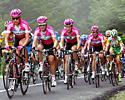
|
Was the team's new anti-doping policy a major factor in athletes saying no to T-Mobile? "Some felt uncomfortable with our anti-doping philosophy, but the general uncertainty about the team didn't help. You know, who's on the team, who are these new managers, where is T-Mobile really at. There was just some general concern that was not helpful to our recruiting, and a lot of negative statements back and forth between different parties."
Plus, other teams were making good offers. "Other teams were very active in the market. The market is very competitive, just look at Astana and Discovery," Stapleton says. "We lost some riders we talked to Discovery. Astana has totally changed the market. They've hired many, many good riders. What their budget is, I don't know. Maybe it's tied to the price of oil!" he laughs. "I don't think we'll ever know how big it is, but they are a major economic force. Every rider that could play a role in the Tour has been snapped up by a couple of teams, with Astana being very prominent."
Which riders would he buy, if he could? Stapleton shudders at the thought. "I wouldn't 'buy' anyone. You have to want to be on this team. We talked about self-selection. You've got to believe in what we're doing and are you committed? I don't want to 'buy' anybody. I think that's a bad idea. If you don't believe in teamwork, if you don't believe in the things we do, you shouldn't be a part of us."
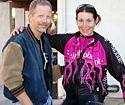
|
"The team has only 27 riders right now, so there is still space for up to three more riders. "There will be a few more coming; we have a few more in the works." Will they be big names? "I think it will be a combination of the mixture that you see, experienced athletes who can do the work and then some promising young talent."
Exactly that mixture of young and old stands out in the new signings. Of those newcomers, two are 21 or younger, and 7 are over 30. The age difference is remarkable - and planned. The team already has a few older, experienced riders, and a core of middle-20s riders. "We felt like we had to get some young talent. That's really been a problem for the team in the past. They've even felt they're not welcome. Now we've got a group of young athletes who have really good chances, and I think that will draw more young athletes. To really succeed, we need a group of veterans who know the races, know the work, know the tactics and can themselves win races, but also are willing to work in a team environment."
Which leads to the question of his favourite T-Mobile rider. "It's one you might not expect," he says. "And that's Giuseppe Guerini. Here's a guy who wins stages of the Tour many years apart, a tireless worker, a good character, a real role model and a great teammate. I'm glad that we have athletes like him. He fits the model that we're talking about, the experienced guy who can impact those younger professionals."
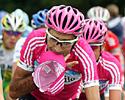
|
He credits the team selection to the new sports manager, Rolf Aldag. "If there's anyone who knows anything about hard work on the bike, it's Rolf." He also credits Aldag for the new group of Directeurs Sportif. Brian Holm, for example, is "a hard man, but also a cancer survivor. He's got a much broader perspective. He can be very intensive but also very supportive, so I think he was uniquely qualified." The other carry-over from this year's team of DS's is Valerio Piva. "He's got a lot of passion, a lot of knowledge and experience." He admits to not knowing Tristan Hoffman and Alan Peiper too well yet, but notes that it is an internationally diverse group, "and that diversity is important for recruiting athletes in the future."
The Directeurs Sportif will play a new role next year. Each will have a number of riders "assigned" to him, with whom he is to stay in close contact and be available for answers, advice or whatever the rider needs. "One problem in the past was the lack of communication between management and riders. I think the informal communication can be quite significant, but I think the way you solve that is to build personal relationships," says Stapleton. "For me, it's important that we communicate and stay clearly involved in all the decisions of the management and team, and that there's personal communication with the athletes."
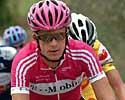
|
"We are forever recruiting," he says. "We are already looking now as to who we might sign in the future. We want to set the foundation and be able to be opportunistic." He doesn't expect to win the Tour de France next year, but expects to have some wins along the way. "Athletically, we must be broadly competitive. We will compete over the entire year." Who does he expect to win the Tour de France? "Right now there's only a handful of people who look like they could be Tour contenders. Could we have one of those in the future? Maybe. Could we grow our own? I hope so. I hope that Rogers can continue to improve and that some of the promising young talent like Gerdemann will go in that direction."
He has concrete plans in place as to how to prepare for the coming season. The first team-building sessions will be held at the first team meeting in the middle of October in Lugano, directly after the Giro di Lombardi. "It won't be as media-friendly as the military style training, but I think it will be effective. It will involve some physical challenges that require you to work together with others or somebody might wind up on the ground. There's a small element of danger, just enough to get your attention. We were going to do river rafting, but we weren't sure they could all swim," he laughs.
There will also be a series of small training camps, tied into to another new factor: exploiting the American market, an important one to sponsor T-Mobile. "We'll do one before the Tour of California, which will help the riders adjust to the dramatic time difference and we can tie in to T-Mobile's activities in the U.S." The team plans to ride the Tour of Georgia for the first time and is looking at the new Montreal-Boston race, which unfortunately conflicts with the Tour de France and the Deutschland Tour.
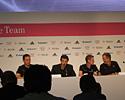
|
Speaking of the sponsors -- how much power do they have in bringing about change? What would happen if they all came together and said, this is what we want? "I think they can play a big role. But, you know, there's a lot of smaller companies that really can't devote the resources to it. I think if they begin to force a powerful commitment to a fair sport, it's possible. I think the economic forces need to exert their muscle in the sport as well. You know, these programs are not inexpensive. They consume a lot of resources, a lot of management attention. The sponsors will have to test their total resolve."
And there are more changes in the bigger picture for which Stapleton sees a need. "I think there are a lot of structural changes that need to be made. Thecalendar needs to be looked at, for example. In the anti-doping area, there's not a good exchange of information. There's not a standard for test results, even from WADA and the national doping agencies. To me, that makes no sense. You know, there are factions within the sport, the UCI versus the Grand Tours, and you've got a lot of people working against the greater interest of the sport for their own interests. I do think structural changes need to be made."
More specifically, he says, "The sport needs to be media-friendly. It needs to be audience friendly. Right now you have to be a fan to watch anything other than the Vuelta, the Giro and Tour. I think that's something we'll be more involved with over time. First we have to concentrate on getting our own house in order, but I think we'd like to push things in the policy direction over time."
Getting the T-Mobile house in order means also surviving its first season without a superstar contender in the Tour de France. "It will be an interesting year, that's for sure. We've got a good classics team. We've got a good sprint team. I think the only dimension we don't have is a big superstar." But the American businessman doesn't let that bother him. "I think we're being pragmatic. We make the most of the cards in our hand."
Photography
For a thumbnail gallery of these images, click here
Images by Fotoreporter Sirotti
- Michael Rogers is set to lead the T-Mobile outfit into the future
Images by Kristy Scrymgeour/Cyclingnews
- Bob Stapleton, the team's new general manager, believes he has the basis of the world's best cycling outfit
Images by Elmar Krings
- Fromer T-Mobile rider Rolf Aldag has re-joined the team as Director of Sport Management
Images by Jonathan Devich/epicimages.us
- A total of 14 new riders will join the team's remaining 16 for the 2007 squad
Images by Fotoreporter Sirotti
- Jan Ullrich's implication in the Fuentes doping case nearly brought an end to T-Mobile's support of cycling
Images by Susan Westemeyer/Cyclingnews.com
- Aldag and Stapleton hidden by photographers
- The Podium. From left, team doctor Andreas Schmidt, team doctor Lothar Heinrich, T-Mobile spokesman Christian Frommert, Head of Sport Managment Rolf Aldag, General Manager Bob Stapleton
- Aldag
- Stapleton
- Germany's new Dream Team? Aldag and Stapleton
- Aldag and Stapleton
